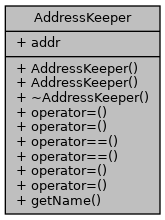This is the class used to store the name, and memory adddress, of the variables used in the model simulation.
More...
#include <addresskeeper.h>
|
| double * | addr |
| | This is the memory address where the value of the variable is stored. More...
|
| |
This is the class used to store the name, and memory adddress, of the variables used in the model simulation.
◆ AddressKeeper() [1/2]
| AddressKeeper::AddressKeeper |
( |
| ) |
|
|
inline |
◆ AddressKeeper() [2/2]
◆ ~AddressKeeper()
| AddressKeeper::~AddressKeeper |
( |
| ) |
|
|
inline |
◆ getName()
| const char* AddressKeeper::getName |
( |
| ) |
const |
|
inline |
This will return a null terminated text string containing the name of the stored variable.
- Returns
- name
◆ operator=() [1/4]
◆ operator=() [2/4]
| void AddressKeeper::operator= |
( |
const char * |
str | ) |
|
|
inline |
This operator will set the name of the AddressKeeper equal to an existing string.
- Parameters
-
◆ operator=() [3/4]
| void AddressKeeper::operator= |
( |
double & |
value | ) |
|
|
inline |
This operator will set the address of the AddressKeeper equal to an existing vale.
- Parameters
-
| value | is the value to copy |
◆ operator=() [4/4]
| void AddressKeeper::operator= |
( |
double * |
address | ) |
|
|
inline |
This operator will set the address of the AddressKeeper equal to an existing address.
- Parameters
-
| address | is the address to copy |
◆ operator==() [1/2]
| int AddressKeeper::operator== |
( |
const double & |
value | ) |
|
|
inline |
This operator will check to see if the address for the AddressKeeper is equal to an existing address.
- Parameters
-
| value | is the address to check |
- Returns
- 1 if the two addresses are equal, 0 otherwise
◆ operator==() [2/2]
| int AddressKeeper::operator== |
( |
const double * |
address | ) |
|
|
inline |
This operator will check to see if the address for the AddressKeeper is equal to an existing address.
- Parameters
-
| address | is the address to check |
- Returns
- 1 if the two addresses are equal, 0 otherwise
◆ addr
| double* AddressKeeper::addr |
This is the memory address where the value of the variable is stored.
The documentation for this class was generated from the following file:
